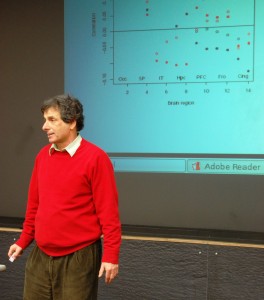 Péter Érdi is a Hungarian and now also Hungarian-American researcher and teacher. His ambition has been to work in the spirit of cybernetics and systems theory. He serves as the Henry Luce Professor of Complex Systems Studies at Kalamazoo College, Kalamazoo, Michigan, and also keeps his position in Budapest in the Complex Systems and Computational Neuroscience Group of the Wigner Research Centre for Physics, Hungarian Academy of Sciences. In addition, he is the founding Co-Director of BSCS – Budapest Semester in Cognitive Science study abroad program.
Péter Érdi is a Hungarian and now also Hungarian-American researcher and teacher. His ambition has been to work in the spirit of cybernetics and systems theory. He serves as the Henry Luce Professor of Complex Systems Studies at Kalamazoo College, Kalamazoo, Michigan, and also keeps his position in Budapest in the Complex Systems and Computational Neuroscience Group of the Wigner Research Centre for Physics, Hungarian Academy of Sciences. In addition, he is the founding Co-Director of BSCS – Budapest Semester in Cognitive Science study abroad program.
His major books:
- Péter Érdi and János Tóth: Mathematical Models of Chemical Reactions: Theory and Applications of Deterministic and Stochastic Models. Princeton University Press 1989
- Michael A Arbib, Péter Érdi and János Szentágothai: Neural Organization: Structure, Function, and Dynamics. The MIT Press 1997
- Péter Érdi: Complexity Explained. Springer, 2007
Dr. Érdi is among others the member of such institutions as the Board of Governors of the International Neural Network Society, the IEEE Computational Intelligence Society University Curriculum Subcommittee, the FENS-IBRO European Neuroscience Schools Programme and the Editorial and Programme Advisory Board of the Springer Complexity publishing program.
1. Can you briefly describe your field of research?
I spent my scientific career by applying the concepts and model frameworks of the theory of dynamical systems to very different levels and problems: from chemical kinetics via neurodynamics to social systems. I have a general interest in computational psychiatry; specifically, recently we uncovered some differences in the causal connection patterns and strengths between healthy and schizophrenic subject during some learning task. In the last several years we analyzed the U.S. patent citation network too extract the governing rules of the network development to establish the methodology for predicting emerging field of technologies.
2. What fascinates you about cybernetics/systems research/system theory?
It is easy to conceive that the movement of cybernetics was driven, at least
implicitly, by the grand utopia that Metaphysics, Logic, Psychology and Technology
can be synthesized into a unified framework. No doubt that cybernetics was an intellectually appealing, ambitious discipline,
partially victim of its own ambition. But many of its tenets survived
under the names of other disciplines, and I think, cybernetics now strikes back. I am still fascinated how cybernetics hoped to be a (or the) bridge between the ”natural” and ”artificial”or in other words, ”organisms” and ”mechanisms”.
Bertalanffy’s systems theory was interested in finding common principles in different disciplines, so he tried to revive the concept of the “unity of science”. He hoped to integrate the different perspectives, and also to analyze and synthesize different forms of complexity. The new systems biology can be seen as the half admitted renaissance of cybernetics and systems theory.
3. Where do you see or would like to see the field heading? What
changes would you like to see?
In spite of much lip service, interdisciplinary research and education is not really appreciated. I feel very important to train the next generation to be able to think with models. By thinking in and with models we consciously give up a language, which implies that we might be the only ones, who are able to know the only truth. We don’t say that “these and these are the facts, and only the facts matter”. A more appropriate language says: “By assuming this and that, and adopting the set of these rules, we may imply this and that”. This is not a shame. We may admit that we are not the owners of the final and infallible truth.
I would like to see established and well-accepted educational programs both at undergraduate and graduate levels to teach complex systems thinking.
4. What impact does your field of research have on society? What
practical application for society does it have? Do you see practical
applications in your own life? Can you give examples?
I think, the perspective what a pluralistic theory of complex systems offers, is the key to understand, explain and control the world which seemed to be derailed. We may have the chance to get a better insight into our own cognitive-emotional structures. Analysis based on the combination of biological and social approaches will help to explain and control our choices and decision makings at individual level, and the evolution of norms and values in societies. Increasing knowledge about our (and others) genes, brains and minds, our willingness to cooperate and compete both individually and in groups should help to understand the world and our role in it.
But of course, flat or not, that will be a different world.
5. What’s a scholar/writer, whose work inspires you in your own work?
Names (and numbers) are dangerous. However, during my (somewhat late) formative years I was certainly influenced by Michael Arbib, Michael Conrad, Robert Rosen and Otto Rössler.
Further links:
Budapest Complex Systems and Computational Neuroscience Group
Center for Complex Systems Studies



